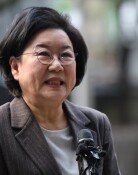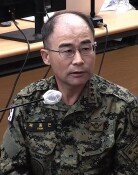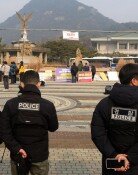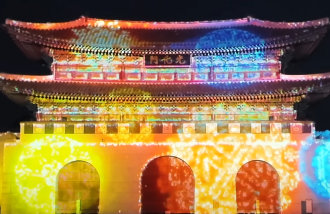Pres. Lee: Inter-Korean Summit is Possible This Year
Pres. Lee: Inter-Korean Summit is Possible This Year
Posted January. 30, 2010 09:13,
Im always ready to meet North Korean leader Kim Jong Il. There is no reason not to meet Kim within this year if our talks are helpful for peace on the Korean Peninsula and the resolution of the nuclear issue.
President Lee Myung-bak said this yesterday in an interview with the BBC on the sidelines of the World Economic Forum in Davos, Switzerland, when asked about holding an inter-Korean summit. "But I have a precondition that we must discuss relevant issues in a fruitful way and sufficiently talk about the nuclear issue, he said.
This was the first time President Lee mentioned the possibility of an inter-Korean summit this year. In the live TV program "Conversation with the President" on Nov. 27 last year, he said, I dont think the venue of the (inter-Korean) summit should be Seoul. Because he said he is open to a summit before the end of the year, observers say the time is ripe for the third inter-Korean summit.
It remains unknown what behind-the-scenes negotiations have produced since South Korean Labor Minister Yim Tae-hee held talks with North Korean Unification Minister Kim Yang Gon in Singapore in October last year. The two Koreas also held a meeting of unification officials in November.
A series of signs, however, show that the Lee Myung-bak administration in its third year has a strong will to hold the inter-Korean summit. Key officials of the South`s ruling Grand National Party even say the North Korean border city of Kaesong will serve as the venue, adding the summit could come in the year`s first half.
A high-ranking official of the presidential office in Seoul said, I haven`t heard of any behind-the-scenes negotiations between the two Koreas. But its always the darkest before the dawn.
Others cite the influence of South Korean Ambassador to China Yu Woo-ik as well as inter-Korean working-level meetings between unification officials at the Kaesong industrial complex.
Whether the inter-Korean summit happens will depend on its agenda. In other words, agreement on the agenda, including Pyongyang`s nuclear and weapons programs and repatriation of South Korean POWs and civilians kidnapped by the North, is more significant than variables such as the South`s local elections in June, the World Cup soccer finals in South Africa, and Seoul`s hosting of the Group of 20 summit in November.
President Lee did not mention kidnapped South Korean POWs and civilians in the BBC interview. One of his aides present at the interview said the president did not mention the matter because he was not asked about South Koreans being detained by North Korea.
The Lee administration also said it will not repeat the mistakes Seoul made in the two previous summits. Senior presidential secretary for public relations Lee Dong-kwan said, Inter-Korean relations should not be dictated by the two Koreas. Instead, they should be changed into a universal relationship acceptable by the international community. Inter-Korean relations have also moved in that direction.
In the interview, President Lee also mentioned North Koreas firing of artillery in the Yellow Sea this week, saying, North Koreas artillery fire might be part of a strategy to sign a peace treaty since it has been strongly asked to participate in the six-party talks. It might also be an attempt to press the South to hold inter-Korean dialogue. Regardless of the intention, artillery fire is not a good measure.
"I dont think North Korea faces extreme difficulty or is about to collapse. South Korea should prepare for the worst-case scenario but North Korea doesn`t seem on the verge of collapse.
yongari@donga.com




![화장실 갇혔을 때 생존법…“최후에는 변기뚜껑” [알쓸톡]](https://dimg.donga.com/c/138/175/90/1/wps/NEWS/IMAGE/2025/12/26/133042007.3.png)


